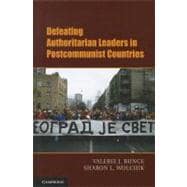
Note: Supplemental materials are not guaranteed with Rental or Used book purchases.
Purchase Benefits
What is included with this book?
| List of Figures and Tables | p. viii |
| Acknowledgments | p. ix |
| The Puzzle | |
| Breakthrough Elections: Mixed Regimes, Democracy Assistance, and International Diffusion | p. 3 |
| Electoral Stability and Change in Mixed Regimes | p. 35 |
| Case Studies | |
| The 1998 Elections in Slovakia and the 2000 Elections in Croatia: The Model Solidifies and is Transferred | p. 53 |
| Defeating a Dictator at the Polls and in the Streets: The 2000 Yugoslav Elections | p. 85 |
| Ukraine: The Orange Revolution | p. 114 |
| Georgia: Kyrgyzstan: Fraudulent Parliamentary Elections, Mass Protests, and Presidential Abdications | p. 148 |
| Failed Cases:. Azerbaijan, Armenia, and Belarus | p. 177 |
| Comparative Analyses | |
| Explaining Divergent Electoral Outcomes: Regime Strength, International Democracy Assistance, and Electoral Dynamics | p. 115 |
| The Electoral Model: Evolution and Elements | p. 247 |
| The Cross-National Diffusion of Democratizing Elections | p. 278 |
| After the Elections: Explaining Divergent Regime Trajectories | p. 307 |
| Conclusions: Democratizing Elections, International Diffusion, and U.S. Democracy Assistance | p. 327 |
| Appendix: List of Interviews | p. 353 |
| Index | p. 367 |
| Table of Contents provided by Ingram. All Rights Reserved. |
The New copy of this book will include any supplemental materials advertised. Please check the title of the book to determine if it should include any access cards, study guides, lab manuals, CDs, etc.
The Used, Rental and eBook copies of this book are not guaranteed to include any supplemental materials. Typically, only the book itself is included. This is true even if the title states it includes any access cards, study guides, lab manuals, CDs, etc.